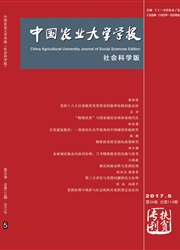

 中文摘要:
中文摘要:
基于系统GMM估计方法分析我国粮食进口与国际粮食价格间的关系,表明国际粮食价格变动主要受其自身惯性的影响,我国粮食进口与国际粮食价格之间存在着较为显著的正向弹性关系,尽管"大国效应"很微弱,但要警惕未来我国进口对国际粮价的影响。需要注意的是,我国粮食进口使得国际化肥供给价格弹性增大,因此我国粮食进口要充分考虑世界供给能力,提前给予世界一个明确的信号或合理稳定的进口需求预期。生物质能源产量、原油价格与国际粮价的弹性关系趋向式微,表明我国粮食进口稀释了生物质能源和原油与粮食之间的价格需求弹性。为此,要密切注意国际性因素对粮食价格波动造成的影响,增强合理利用国际市场和国际资源的能力,从而保障国内粮食安全。
 英文摘要:
英文摘要:
This paper applies the system GMM estimation method on the analysis of relation between grain import by China and international grain price. The results show that the former obtains the significantly positive but low elasticity to the latter,despite the fact that international grain price is mainly influenced by its lagged value. Hence,we propose that China should be aware of the impacts on international grain market of its increasing import volume. Besides,the elasticity of fertilizer rises up due to the introduction of grain import by China as independent variable. On the contrary,the elasticities of biofuel production and oil price dwindle. According to these changes,we propose China should take the world's food supply capacity into careful consideration and release the explicit signal or formulate the stable expectation to the world market before the act of import. Besides,China should observe carefully the international factors to the volatility of international grain price in order to secure food supply by making appropriate use of the international market.
 同期刊论文项目
同期刊论文项目
 同项目期刊论文
同项目期刊论文
 期刊信息
期刊信息
